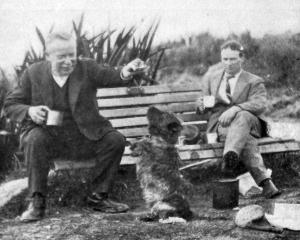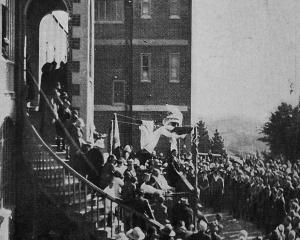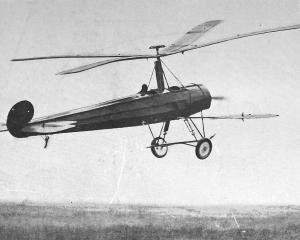A member of our staff, who has just made the overland trip from Lake Wakatipu to Martin's Bay, on the West Coast, had ample opportunities of studying this question, and he gives it as his opinion that the native birds are doomed.
On the trip referred to, through forests of birch which once echoed to the music of song birds, there was a most noticeable absence of bird life.
From Elfin Bay to Martin's Bay the overland party did not see one tui.
they saw about three "Mockies'' and a similar number of tomtits, and one Maori hen crossed their path.
A kaka and some native pigeons were also noticed, and at nights the call of a few moreporks was heard.
Certainly, one or two flocks of quaint looking, tailless wrens were seen, but the writer is not sure whether these are native to New Zealand or not.
For long stretches of forest not one native bird would be flushed.
One night at the Middle Hut the subject of the absence of the birds was brought up.
The Messrs McKenzie (who have lived all their lives at Martin's Bay), Mr E. H. Green (who has spent most of his life in the same locality, and on the West Coast), and Mr J. Pellow (Lake County Inspector of works) were unanimous in the view that the stoats, weasels, and ferrets were killing out the birds.
There are no rabbits in the Hollyford Valley, but there are plenty of the animals which were brought to New Zealand to kill them out.
These animals have evidently left the rabbits behind, and have pushed into the forest country in quest of birds.
The authorities named agreed that the stoats, weasels, and ferrets would tackle any kind of bird, and that the rivers would not stop them in their insatiable desire.
Mr Green stated that the cock weka always gave its enemies a fight for its life, but usually had to succumb at the finish, and that the hen weka was easily taken when laying its eggs in its nest.
The greatest antipathy is certainly shown to the sinuous-bodied animals, and they are chased and killed in nearly every instance.
They, however, must now be numbered in their thousands; they have already done irretrievable damage to the native birds, and from what he has himself seen, and after listening to the opinions of men who know, our reporter cannot see anything to stop them from killing off entirely the native birds.
• "T.D.'', writing from Mosgiel, complains of the extent of the home lessons that are imposed upon school children, and apostrophises the school teachers in the following terms: "If you teachers would train in the children under your care a healthy mind it is greatly to their advantage to have also a healthy body. Think you that home tasks taking up anything to four hours of their evenings and mornings are conducive to their good health? Further, is not their time for play only too often haunted by memories of lessons unfinished, of difficult problems unsolved, or with visions of a Nemesis-like teacher awaiting them with the ever-ready rod of correction? Oh, you teachers, you teachers, who cram your pupils' minds with a conglomerate mass of facts and send them home with lessons which exercise their overworked brains for the rest of the day; which send them to bed dog-tired and irritable, and waken them in the morning with the every-present sense of badly prepared work; who extort from them the last tithe of their obligations to you, do you wonder that in school they shirk in your absence and rejoice when your backs are turned?''- ODT, 28.3.1916.
• COPIES OF PICTURE AVAILABLE FROM ODT FRONT OFFICE, LOWER STUART ST, OR WWW.OTAGOIMAGES.CO.NZ












